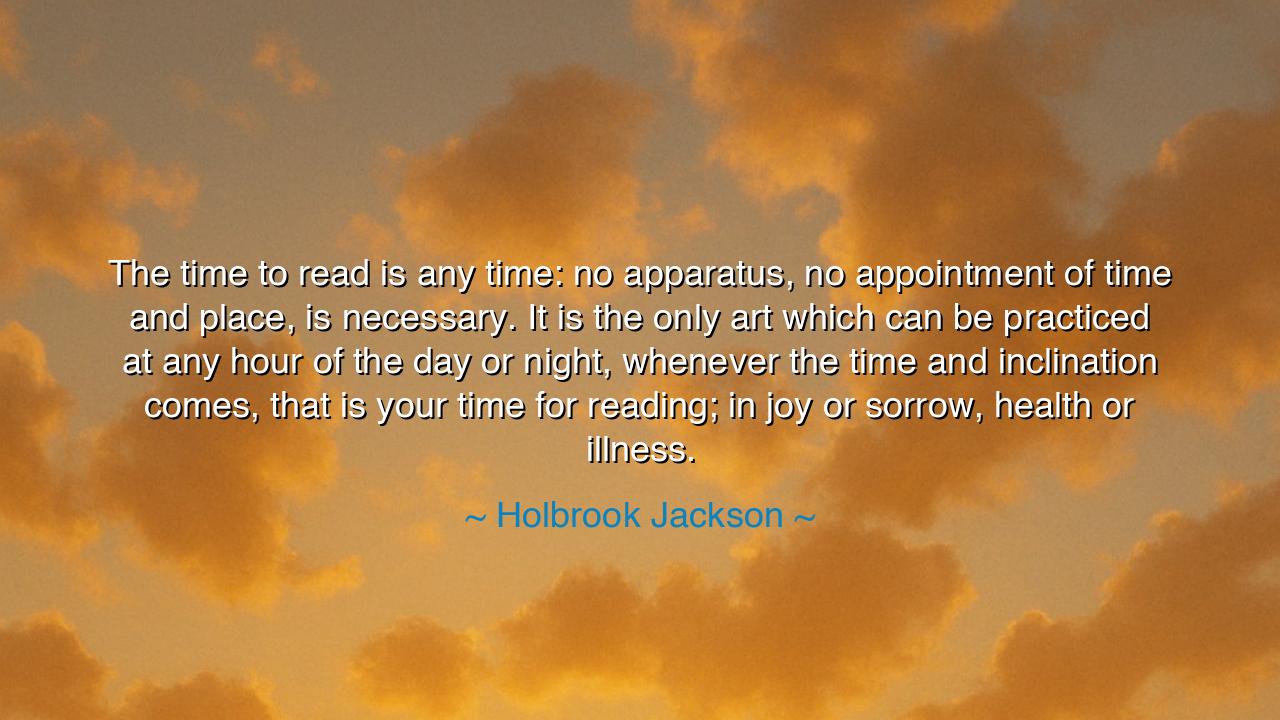
The time to read is any time: no apparatus, no appointment of
The time to read is any time: no apparatus, no appointment of time and place, is necessary. It is the only art which can be practiced at any hour of the day or night, whenever the time and inclination comes, that is your time for reading; in joy or sorrow, health or illness.






The thinker Holbrook Jackson once spoke words that flow like sunlight through the shutters of time: “The time to read is any time: no apparatus, no appointment of time and place, is necessary. It is the only art which can be practiced at any hour of the day or night, whenever the time and inclination comes, that is your time for reading; in joy or sorrow, health or illness.” Though he wrote of reading, he was, in truth, describing freedom—the sacred liberty of the mind to wander, to dream, to commune with wisdom across the boundaries of circumstance. In these words lies not only the love of books, but the eternal reminder that the mind’s awakening needs neither wealth nor privilege, only the quiet willingness to open the soul to thought.
Reading, Jackson reminds us, is not an act confined by the world’s schedules or the chains of obligation. Unlike the trades that demand tools, or the arts that require audience and stage, reading belongs to the heart’s solitude. It asks no permission, it keeps no hour, and it bows to no master. Whether under the bright gaze of morning or by the dim glow of a candle in the night, the page stands ready, patient as a friend who waits without complaint. To read is to commune with eternity—it is the art of meeting the minds of the dead and the dreams of the living, all within the span of a heartbeat.
Think, then, of Abraham Lincoln, born in poverty, with no school to guide him and no tutor to instruct him. He read by firelight, by moonlight, by the fragile hours between labor and sleep. His tools were not books alone but the hunger for understanding. From that humble practice grew the mind that would hold a nation together. For Lincoln, as for Jackson, the time to read was any time—in hardship or hope, in weariness or wonder. He turned reading into both refuge and weapon: a shield for the spirit and a sword for truth.
To the ancients, this art was divine. The Greeks spoke of the Logos, the Word, as the soul’s breath; the Egyptians carved thought into stone so that memory might not die. Yet Jackson speaks of reading not as sacred ritual but as daily bread—as nourishment that can be taken anywhere, at any hour, by anyone who hungers. He teaches that wisdom is not the property of scholars, but the inheritance of all who would listen. Thus, reading becomes the equalizer of existence: the poor man’s kingdom, the weary soul’s rest, the sick man’s escape into worlds untouched by pain.
But there is a deeper wisdom still. When Jackson says that reading may come “in joy or sorrow, in health or illness,” he speaks to the eternal rhythm of the human heart. For reading does not flee from suffering—it transforms it. In joy, it deepens; in sorrow, it consoles. A book read in laughter and the same book read in grief are not the same, for the reader himself has changed. Thus, every reading becomes an act of renewal, a new encounter with truth shaped by the season of one’s soul.
The lesson, my children of ink and light, is this: never wait for perfect peace before opening a book. There is no “right time” to begin learning, no “better season” to seek wisdom. Read when the heart is quiet, and when it is troubled; read when fortune smiles, and when it turns away. Let books accompany you as companions through the years—faithful in silence, steadfast in chaos, ever ready to remind you that thought cannot be imprisoned.
So take Jackson’s words as both comfort and command: “The time to read is any time.” Carry this truth as the ancients carried fire across the dark plains of the earth. Let every page be a lamp, every sentence a spark. Whether you stand in the marketplace or lie upon a sickbed, whether the sun burns or the night endures—open the book. For within its lines lives the eternal promise that wisdom is never out of reach, and that the mind, once awakened, can find its hour in every moment.






AAdministratorAdministrator
Welcome, honored guests. Please leave a comment, we will respond soon